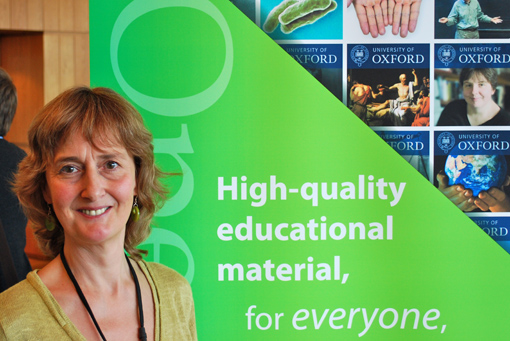Oxford Gets Wired
The whole process has been dubbed ‘The University of iPod’ because of the simplicity involved in pulling educational content on to the portal media player. The user usually finds the subject material via a free text search across the whole iTunesU directory. From the results page they can select their preferred material and with one click subscribe to the whole series. The material can easily be synchronised across to the media player using the same system as used for downloading music. The subscription element – the ability to alert and notify the learner when more content is available – is the primary difference between the YouTube and iTunesU delivery models. This is key for building a relationship between the University and the user. There are currently 10 UK universities in the iTunesU directory and in YouTube Edu, the other major third-party educational media portal.
Marianne Talbot, an Oxford philosophy lecturer, is one of the early pioneers. After agreeing to record a series of introductory philosophy courses for the Department of Continuing Education she thought nothing more about it. Over time her material became more and more popular on the iTunesU system. When contacted by the technical team to say that she was currently the global number one, she started to reflect on what was happening, “I was tickled pink, I wondered what this meant? I started thinking: how many downloads is that? Presumably more than 20, but is it 100?” She was amazed to find she actually getting more than 5,000 downloads per week, already reaching more people than she will teach in a lifetime. Initial interest was success probably inspired by the engaging title ‘A Romp through the History of Philosophy’ but the feedback from her philosophy fans has been very positive, leading to Marianne recording more talks and seminars.
The business case for the service is based upon meeting various needs across the University: giving current students and staff access to colleagues’ work, while also reaching out to potential applicants and our global alumni audience. The Admissions Office at Oxford was the first to grasp the opportunity of podcasting, using this medium to give potential applicants an insight into life at Oxford. As one new student this year said, ‘I found the podcasts from the Admissions Office really helpful. As an international student they were a really good way for me to learn about the admissions procedure, as it’s not as easy for international students to come to the open days as it is for UK residents’.
After the first year of the iTunesU service, Oxford took the opportunity of widening the potential reuse of the material by looking further at the licences that the podcasts were released under – under an initiative called ‘OpenSpires’.
OpenSpires was funded under JISC and the Higher Educational Academy’s Open Educational Resources Pilot Programme: a funding initiative designed to support institutions, consortia and individuals in releasing open educational resources for use, reuse and repurposing worldwide. A key inspiration in this endeavour is the report written by Professor Sir Ron Cooke, chair of JISC, in 2008 entitled On-line Innovation in Higher Education. Commissioned by the UK government, the report provided expert advice and recommendations about how the country can become one of the leading centres of online higher education in the world. One of the findings of that report was that:
 Learning on Screen
Learning on Screen
